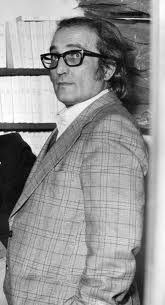Justice Prohibited: Difference between revisions
m (1 revision) |
No edit summary |
||
| Line 1: | Line 1: | ||
====Date: [[:Category: | ====Date: [[:Category:1961|1961]]==== | ||
====Region: [[:Category:Europe|Europe]]==== | |||
====Subject: [[:Category:Language|Language]] [[:Category:Racial/Ethnic|Racial/Ethnic]]==== | |||
====Medium: [[:Category:Literature|Literature]]==== | |||
====Medium: [[:Category:Literature|Literature | |||
---- | ---- | ||
[[File:Aresti.jpg|right]] | |||
'''Artist:''' Gabriel Aresti | '''Artist:''' Gabriel Aresti (1933 - 1975) | ||
'''Confronting Bodies:''' Spanish government under dictator Francisco Franco | '''Confronting Bodies:''' Spanish government under dictator Francisco Franco | ||
'''Date of Action:''' 1961 | |||
''' | |||
'''Location:''' Spain | '''Location:''' Spain | ||
'''Description of Artwork:''' Aresti wrote poems that are compared to the allusiveness and density of T.S. Elliot; also known to be full of contradictions. His work was written in Basque. <P> | '''Description of Artwork:''' Aresti wrote poems that are compared to the allusiveness and density of T.S. Elliot; also known to be full of contradictions. His work was written in Basque. <P> | ||
'''The Incident:''' When Franco became the dictator of Spain in 1936 he forbid the use of languages other than Castilian that were present in Spain, such as Catalan and Basque. Aresti's poetry was met with resistance for its use of the Basque language. In his book, ''Justice Prohibited'' (1961), he took a direct political stance and was promptly banned. <P> | |||
'''The Incident:''' When Franco became the dictator of Spain in 1936 he forbid the use of languages other than Castilian that were present in Spain, such as Catalan and Basque. Aresti's poetry was met with resistance for its use of the Basque language. In his book, | |||
'''Results of Incident:''' Aresti conspired with other Basque writers in France who began creating and publishing openly in Basque. His work, which delineated from Basque songs and oral traditions, are regarded among the most influential works in Basque literature. <P> | '''Results of Incident:''' Aresti conspired with other Basque writers in France who began creating and publishing openly in Basque. His work, which delineated from Basque songs and oral traditions, are regarded among the most influential works in Basque literature. <P> | ||
'''Source:''' Censorship, A World Encyclopedia, ed. D. Jones | '''Source:''' Censorship, A World Encyclopedia, ed. D. Jones | ||
[[Category:1961]] | |||
[[Category:1960s]] | |||
[[Category: | [[Category:20th century]] | ||
[[Category:Europe]] | [[Category:Europe]] | ||
[[Category:Language]] | [[Category:Language]] | ||
[[Category:Racial/Ethnic]] | [[Category:Racial/Ethnic]] | ||
[[Category:Literature]] | [[Category:Literature]] | ||
[[Category:Gabriel Aresti]] | [[Category:Gabriel Aresti]] | ||
Revision as of 21:12, 12 December 2011
Date: 1961
Region: Europe
Subject: Language Racial/Ethnic
Medium: Literature
Artist: Gabriel Aresti (1933 - 1975)
Confronting Bodies: Spanish government under dictator Francisco Franco
Date of Action: 1961
Location: Spain
Description of Artwork: Aresti wrote poems that are compared to the allusiveness and density of T.S. Elliot; also known to be full of contradictions. His work was written in Basque.
The Incident: When Franco became the dictator of Spain in 1936 he forbid the use of languages other than Castilian that were present in Spain, such as Catalan and Basque. Aresti's poetry was met with resistance for its use of the Basque language. In his book, Justice Prohibited (1961), he took a direct political stance and was promptly banned.
Results of Incident: Aresti conspired with other Basque writers in France who began creating and publishing openly in Basque. His work, which delineated from Basque songs and oral traditions, are regarded among the most influential works in Basque literature.
Source: Censorship, A World Encyclopedia, ed. D. Jones
